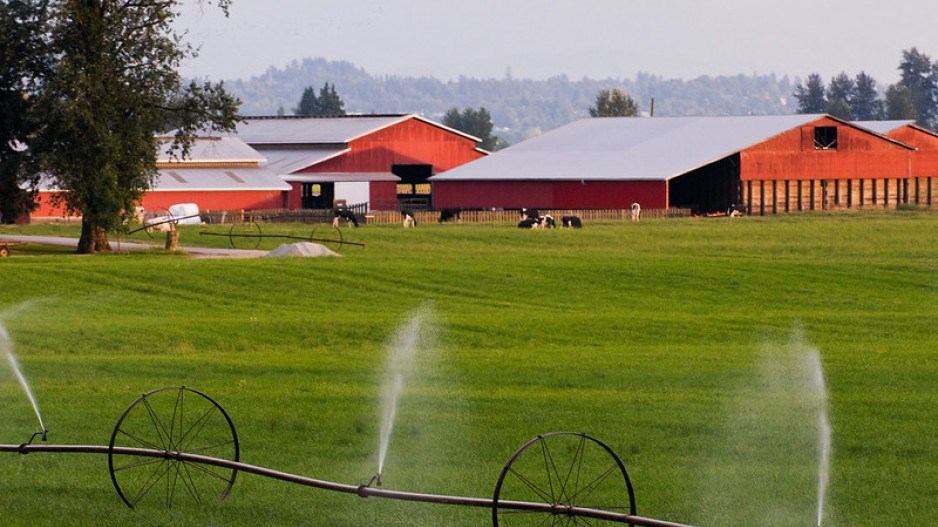Floods, fires, and heat domes have forced British Columbia to grapple with immediate threats. But as we confront these emergencies, we also need to move swiftly and collaboratively to address the long-term implications for our communities, our economy and our health.
We need to talk about food security – urgently.
The Okanagan Valley, where recent wildfires have left new scars, contributes a quarter of British Columbia's agricultural output, including 96 per cent of its soft fruits. Drought conditions across two-thirds of the province have left livestock feed in short supply and hay prices skyrocketing. Abbotsford, still rebounding from the massive 2021 floods, accounts for almost 40 per cent of farm gate receipts in B.C., with the Fraser Valley as a whole accounting for half our total food production.
An ambitious proposal, years in the making, would unlock billions in private sector investment toward confronting these challenges head on. The Abbotsford Tech District is a 140-acre mixed-use development that will serve as a major hub for education, inspiration, innovation and commercialization, starting with agricultural technology. It will create jobs and opportunities in Abbotsford and beyond while helping one of the most productive farming areas in North America become one of its most innovative, too.
Like the challenges we face, the opportunities are both far-reaching and immediate. Long-term thinking and big global ambitions must be balanced with practical, grounded, market-driven innovations that help existing local producers feed more people next season while making more money to support their own families and workers. It's crucial that we break down the disconnect between abstract academic conversations about the future of food and the on-the-ground realities of actual farmers.
By working with partners like the University of the Fraser Valley and the Abbotsford School District, the Tech District will help unlock a high-quality, forward-looking "K-to-16" approach to agricultural education to help inspire and prepare smart young people to become the tech-enabled and value-added farmers and food producers of the future. They are the ones we will all rely upon to generate innovation we can eat.
Native American humourist Will Rogers once said that “the farmer has to be an optimist or he wouldn't still be a farmer.” So, let’s imagine the future that could be.
Imagine the University of the Fraser Valley launching a world-class MBA in agricultural leadership and technology. That's a natural and realistic niche that aligns with the university's founding purpose, but exceeds the grasp of its current resources – despite it serving the largest population centre in Canada without a comprehensive university.
Picture its ambitious graduates, alongside other entrepreneurs from throughout B.C., tapping into an onsite incubator that helps them develop and protect innovative business models that have passed the renowned ‘BS’ detectors of actual farmers.
Think about the implications of an integrated venture capital fund that draws local and global investment into B.C.'s agritech potential, rather than companies leaving to thrive elsewhere. Imagine not just unlocking local innovation but fundamentally re-orienting B.C. from a net importer to a leading exporter of agricultural innovation.
Imagine a revitalization of Indigenous land stewardship and food production that supports economic reconciliation.
That's just a glimpse of what’s possible in endowed spaces within the proposed B.L. Au Centre for Innovation and Food Security. This approximately $50 million building will not only be the physical cornerstone of the proposed Abbotsford Tech District, but will also drive the growth of a local tech cluster for decades to come – starting with agritech.
As "work from anywhere" trends intensify, housing has become increasingly unaffordable in desirable suburbs, including Abbotsford, which has been identified by the provincial government as a top 10 priority for new affordable housing supply.
Abbotsford Tech District aims to be part of the solution, proposing a complete community that pairs high-quality education and well-paying jobs with affordable multi-family housing options for students, young professionals and families to live, learn, work and play. By building up not out, the Tech District will reduce the footprint of new development and preserve cherished natural areas and trail networks on Sumas Mountain.
After more than three years of quiet planning and wide-ranging stakeholder engagement, the Abbotsford Tech District concept will be put to the test in the months ahead. After a period of public consultation, Abbotsford City Council will consider an Official Community Plan amendment that would redesignate 140 acres of land, currently zoned for greenfield residential development, as a mixed-used innovation centre with spaces for affordable housing, education and employment.
Their decision is about more than just colours on a map. It’s a fork in the road for Abbotsford and a signal of which way the winds are blowing on two of the greatest crises British Columbia faces: Affordability and food security. We’re optimistic.
Gavin Dew is the chief strategy officer for Abbotsford Tech District.


